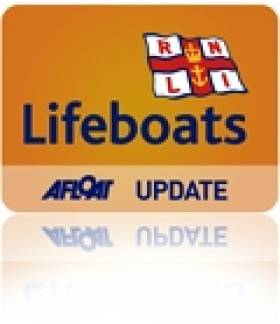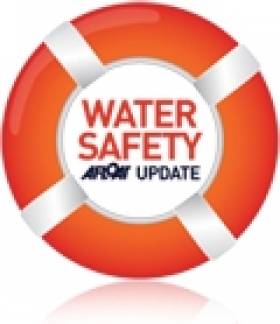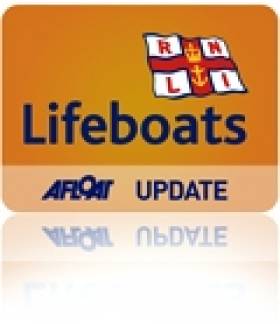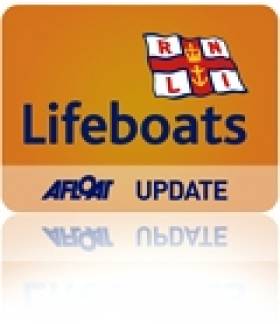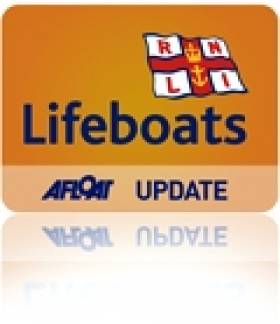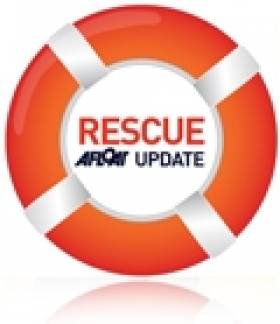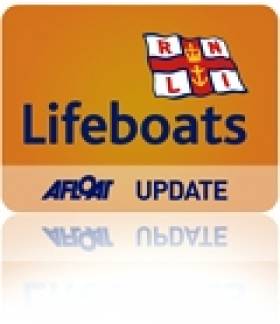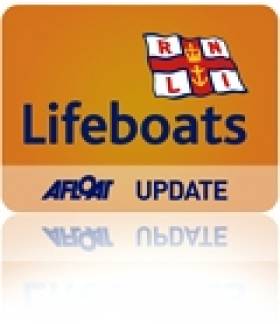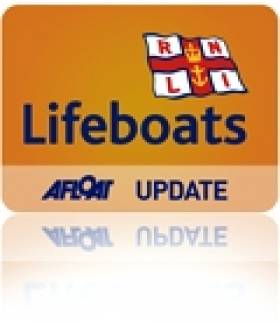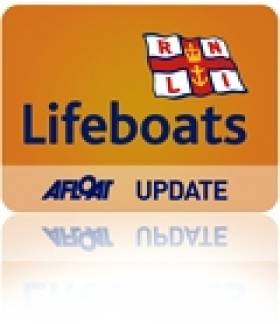Displaying items by tag: RNLI
Arklow, Howth Lifeboats Aid Stricken Sailing Vessels
#RNLI - Following a lifeboat pager alert at 1.18pm yesterday afternoon (Thursday 9 July), Arklow RNLI's volunteer crew launched to a stricken sailing vessel.
Within minutes of the alert, the lifeboat Ger Tigchleaar was en route from Arklow Harbour in good weather and slack winds to the casualty boat, a local sailing yacht about 1.5 miles north. The vessel, with two crew onboard, had suffered engine failure.
Under the direction of coxswain Ned Dillon, the lifeboat crew – Michael Fitzgerald, Andrew Loughlin, Jimmy Myler and Leigh Downey – secured a tow line to the vessel and brought her and her crew back safely to Arklow Harbour, bringing her alongside at the inner dock marina pontoons.
Speaking following the callout, Arklow RNLI volunteer press officer Mark Corcoran said: "Even very experienced sailors can get into difficulty. If you’re going out on the sea, be prepared and plan for the worst and always have a means of calling for help. Always respect the water."
Howth RNLI had a trickier callout to deal with three days earlier after a sailing yacht beached on rocks at Lambay Island.
The lifeboat was on scene and located the casualty vessel just before 11.00am on Monday 6 July. Volunteer lifeboat crew Ian Martin and Ian Sheridan launched their small XP inflatable boat and went ashore to investigate in poor weather conditions, with the win gusting to 58 knots and a rough sea state.
Two men were located aboard and the decision was made by lifeboat coxswain Fred Connolly to request the coastguard helicopter to lift the casualties to safety as the sea was too rough to risk a transfer to the all-weather lifeboat using the XP inflatable.
The two men were airlifted to safety and the lifeboat returned to station in what was described by the volunteer crew as "challenging conditions".
'Operation Safe Water' Brings Agencies Together To Promote Safety Awareness Among Water Users
#WaterSafety - Inter-agency efforts to promote safer enjoyment of the water were the order of the day at Operation Safe Water, which took place in Howth Harbour yesterday (Thursday 9 July).
Members of An Garda Siochana, the Irish Coast Guard and the RNLI took part in the first-of-its-kind operation between the three agencies, with the single aim of improving safety awareness among boat users.
The RNLI Coastal Safety Team were on hand to perform safety checks on lifejackets. "A lifejacket is useless if you don’t wear it, but it’s also important to maintain it properly," said Howth RNLI coastal safety officer John McKenna.
"Three simple steps could help to save your life: check that the gas canister is in good condition and screwed in properly, the firing head is within its expiry date and that a crotch strap is attached securely."
The Irish Coast Guard's Howth unit community safety officer Declan Howard led a team reviewing the essential safety equipment boats entering the harbour should be carrying.
“A roadside breakdown is an entirely different situation to one on the water," he said. 'Having no means of communicating your need for help can have grave implications for you as the boat drifts towards rocks or out to sea.
"The waters in Ireland can offer great enjoyment but if you ignore carrying some of the basic safety equipment you put your crew and yourself at risk of injury or worse”.
Howard added: “With no phone masts, mobile phone reception is hit-and-miss on the water. You need another plan to get out of trouble.”
The operation also reminded people of the dangers of cold water. Falling overboard is easy and can happen in seconds; getting back into a boat or even a kayak is not so easy or quick.
Currently Irish waters are 13 degrees; with no protective clothing, after 10-15 minutes hypothermia will commence and you’ll start to lose the ability to move arms and legs to stay afloat. Within an hour you could be unconscious. Survival is anywhere between one and six hours. If you have no way of letting the coastguard know you need help, the alarm might be raised too late.
Colin Murray, officer in charge of the Howth coastguard unit, said: “The job of the lifeboats and the coastguard is to get to you within that hour, your job is to let us know you need help.
"That means having your kit and emergency plan ready before you go on the water – ie marine VHF radios, flares, protective clothing, etc. This is on top of our summer message No Life Jacket? No Excuse. We want people enjoying the waters and coastline but going out prepared and not getting too complacent about the good weather.”
The inter-agency approach brings all stakeholders together with the aim of reducing the number of incidents on the water and coastline in the area and hopefully helping save lives. Water safety booklets will also shortly be distributed in multiple languages.
#lifeboat – Lough Derg RNLI Lifeboat launched to assist a person on board a 30ft–cruiser with engine failure by Terryglass Harbour, at the northern end of Lough Derg last night.
At 11.55pm Lough Derg RNLI Lifeboat launched to assist a lone boatman, whose 30ft–cruiser had suffered engine failure and drifted into reeds by Terryglass Harbour, at the northern end of Lough Derg. Winds were northerly backing westerly, Force 4, visibility was good.
The lifeboat with helm Eleanor Hooker, Keith Brennan and Lorna Walsh on board, was alongside the casualty vessel at 12.20pm. The elderly person on board was safe, unharmed and wearing his lifejacket, but agitated about his predicament.
An RNLI volunteer crossed over to the casualty vessel and reassured the person before checking the boat for damage. The Lifeboat took the cruiser under tow to one of the floating pontoons in Terryglass harbour.
Lifeboat crewman Jason Freeman, who was in Terryglass at the time, took lines and helped secure the casualty vessel.
Brendan O'Brien, Deputy Launching Authority advises skippers to 'ensure their boat has fresh fuel and is well serviced before going afloat'.
The Lifeboat returned to station and was ready for service again at 2.45pm.
#RespectTheWater – The RNLI is today launching its national drowning prevention campaign, Respect the Water, warning people that the coastlines and waters can be dangerously unpredictable. The campaign which will be run on radio, outdoor and online will also see two hard-hitting ads screened in Irish cinemas over the summer months, which show the effect of cold water shock on the body and the unpredictability of the water.
Figures released by the charity today show an average of 59 people die in Irish waters each year – more than the number of pedestrians and cyclists killed on Ireland's roads.
In 2014 alone, 55 people died by accidental drowning in Irish waterways. The number of near-misses is even higher – last year the RNLI's lifeboat crews around the Republic of Ireland rescued 1,133 people and saved 36 lives.
The RNLI is aiming to halve the number of coastal deaths by 2024 and the charity's national drowning prevention campaign, Respect the Water, is warning people – particularly adult men – to be aware of the dangers of the coastline, as well as the water itself.
The two 60 second commercials will screen in Irish and UK cinemas over the next eight weeks. The first film entitled 'Breathe' is shown from the point of view of the casualty, played by an actor. The narrator invites the audience to hold its breath while watching the film, as the casualty struggles and succumbs to the effects of cold water shock in the time the audience is holding their breath. The film reveals that, on land, the average person can hold their breath for 45 seconds – but in cold water, they might not last 10.
The second film called 'unpredictable' is again shown from the perspective of a casualty, played by an actor and shows the unpredictability of the water and how quickly conditions can turn. Both films have received a 15 age rating.
(N.B. Please note videos contain scenes that some viewers may find distressing)
Joe Moore, RNLI Coastal Safety Manager for Ireland, says: 'We're warning people that if they're going near the water, whatever their activity, they could be at risk and they need to take care. A large number of incidents which happen each year involve people who never even intended to enter the water – slips and falls while walking or running are very common. Unexpected dangers like slippery rocks, sudden waves or unstable ground can catch anyone out.'
The charity is also warning people of the unpredictability of the water, including the dangers of cold water and rip currents. Summer air temperatures may be warm but the average sea temperature is just 12oc. Cold water shock, which causes uncontrollable gasping and numbs the limbs, can set in at any temperature below 15oc.
Rips are strong currents of water which can quickly drag people out of their depth. They account for around two-thirds of the environmental-related incidents lifeguards respond to each year. For those not at a lifeguarded beach, being caught in a rip can prove fatal if they don't take the right steps to free themselves and make it safely to shore.
Joe Moore added: 'The water might look inviting, but it can be dangerously unpredictable, with hazards which can be fatal if not respected. Cold water is a major risk for anyone who ends up in the water – intentionally or otherwise. The body's reaction to sudden immersion in cold water will trigger uncontrollable gasping, which can draw water into the lungs and lead to drowning. The coldness will also gradually shut down the use of limbs, making it very difficult even for strong swimmers to stay afloat.
'We want people to enjoy the water but to make sure they respect it. On average 59 lives are lost around the coast of the Republic of Ireland each year but many of these losses could be avoided if people acknowledge the dangers and follow some basic safety advice.'
The RNLI's Respect the Water campaign, warning people of the dangerously unpredictable nature of our seas and coastlines, will run across Ireland and the UK during the summer, through advertising channels including cinema, outdoor, radio and online.
The charity is also running a number of tailored safety programmes, targeted at those who participate in the activities which account for a large number of coastal incidents each year.
Those interested in finding out more about the dangers of the coast can visit the Respect the Water website and see for themselves at www.rnli.org/respectthewater
#RNLI - Skerries RNLI volunteers launched for their third callout within seven days yesterday (Saturday 04 July) following reports of a kayaker in distress off Gormanston beach.
The pagers sounded shortly after 11.30am this morning, with the lifeboat – launched with volunteer Joe May at the helm and crewed by volunteers Emma Wilson and Paddy Dillon – proceeding directly to Gormanston.
Once on scene it was established that the casualty had abandoned his vessel and his belongings and swam to shore. The crew located an inflatable kayak nearby and recovered it onto the boat to prevent any hazard to other vessels. Conditions at the time were fair with a Force 3-4 northerly wind.
On the previous Thursday evening (2 July), while on a scheduled training exercise, Skerries RNLI were tasked by Dublin Coast Guard to investigate reports of a personal water craft in difficulty near Colt Island in Skerries.
The lifeboat was on scene very quickly as they were on exercise in the area. They located the casualty and took him on board the lifeboat, towing his vessel to the safety of Skerries Harbour. After a routine assessment he was deemed to require no further assistance.
Four days before that, Skerries RNLI brought four people to safety after their racing yacht was holed when they struck rocks near Colt Island, as previously reported on Afloat.ie.
RNLI Lifeguards Rescue Man On Castlerock Beach
#RNLI - RNLI lifeguards rescued a man who found himself in difficulty on Castlerock Beach in Co Derry yesterday afternoon (Friday 3 July).
Shortly before 12.30pm, senior lifeguard Damian McCauley was assisting two vehicles that had got stuck in soft sand at the entrance to the beach when he heard a man call from one of the cars and wave for help.
The man, who was on his own in the car, was hunched over, struggling to breathe with his arms shaking, while his voice was hoarse and weak.
McCauley immediately ran for the lifeguard’s first aid responder bag and, using his training, began to deliver casualty care.
Meanwhile, lifeguard Beth Montgomery, who was acting as the communications liaison, alerted the coastguard and the Northern Ireland Ambulance Service.
Lifeguard Conor O’Callaghan ensured the beach, which had about 300 people visiting at the time and with 40 people in the water, remained open by patrolling between the red and yellow flags.
On monitoring the casualty’s breathing, McCauley observed that oxygen was required and, using the RNLI apparatus, proceeded to ensure the man got this. He continued to carry out casualty care while talking to the man for 25 minutes until the other emergency services arrived.
By that time the man had begun to respond to the oxygen and was then transferred from his car to an ambulance and brought to the Causeway Hospital in Coleraine.
Speaking following the rescue, RNLI lifeguard supervisor Tim Doran said: "We would like to wish this gentleman well and hope he makes a speedy recovery following his ordeal this afternoon.
"He managed to raise the alarm quickly when he found himself in difficulty today and thankfully our lifeguards were able to respond immediately and give him the medical attention he needed right away.
"This rescue is testament to the first aid training our lifeguards have and to the equipment we carry on the beaches which ensure we can deliver good casualty care."
Doran added: "Our lifeguards worked well together today to deal with the emergency, liaise with the other emergency services and keep patrol of the remainder of the beach.
"This incident is another example of how our lifeguards' vigilance is as important on the beach dealing with land-based incidents as it is when patrolling incidents that unfold in the water."
Wicklow Lifeboat Rescues Jetskier After Engine Cuts Out
#RNLI - Wicklow RNLI's inshore lifeboat launched at 2.25pm yesterday afternoon (Friday 3 July) to assist a jetskier north of the harbour.
The jetskier had set off from Wicklow and was about a half mile offshore when the engine cut out, leaving him adrift and unable to get ashore.
Within minutes of launching, the lifeboat reached the casualty, who was then taken on board with his jetski in tow back to Wicklow Harbour.
The inshore crew on this callout were helm Dave O'Leary, Lisa O'Leary and Carol Flahive.
#RNLI - The RNLI will have a fully operational lifeboat station in Belfast City from 9am tomorrow 2 July right through to Sunday evening 5 July for the Tall Ships Races.
With up to 750,000 visitors expected in Belfast over the next four days, a number of volunteers from Bangor and Red Bay lifeboat stations will be on call to provide a 24-hour search and rescue service during the event.
The crew will operate from a temporary lifeboat station located in Belfast Harbour Marina and will respond to any emergency on Belfast Lough using an Atlantic 85 relief lifeboat.
During the Tall Ships Parade on Sunday, both the Atlantic 85 lifeboat and an all-weather Trent class lifeboat crewed by Donaghadee RNLI will be operational on Belfast Lough for search and rescue capabilities.
Speaking ahead of the Tall Ships Races, RNLI divisional operations manager Darren Byers said: "For the duration of the weekend and specifically to accommodate the large numbers expected to descend on Belfast to watch the Tall Ships spectacle, the RNLI will be fully operational at the heart of where all the activities will be taking place.
"Belfast RNLI will operate for four days only supported by its nearest lifeboat stations at Bangor and Larne. This means should there be an emergency during the event, we can reduce the time it takes to get on scene while maintaining a business as usual operation at our flank lifeboat stations."
The RNLI will have a significant presence on site throughout the weekend and has been honoured to be chosen by Tall Ships Belfast as one of five key maritime charities to benefit.
As well as a fully operational lifeboat station, the RNLI will have an all-weather Trent class lifeboat afloat which can be viewed from the quayside at Belfast Harbour Marina. Volunteer lifeboat crew will be on hand to answer any questions and to demonstrate how they use the lifeboat for search and rescue.
RNLI lifeguards who patrol 10 beaches in Northern Ireland during the summer season will also be displaying the rescue water craft and lifesaving kit they use.
Visitors to the RNLI areas can also take part in the ‘Get Your Kit on Challenge’. This is a timed challenge that pits members of the public against the clock to see how long it takes them to put on an inshore lifeboat crew member’s full kit: dry suit with yellow wellies, lifejacket with crotch straps and helmet. The lifeboat crew do this in seconds as they race to launch the lifeboat on a callout.
RNLI community fundraising manager Nicola Kelly is looking forward to the event. "The RNLI is hosting a variety of engaging activities at Tall Ships Belfast and we are honoured to have been selected as one of the official charities to benefit," she said.
"We are looking forward to welcoming visitors to the RNLI areas and hope that in doing so we can provide an entertaining, informative and interesting aspect to the full programme being provided.
"As well as saving lives at sea and on inland waters, the RNLI also provides education along with sea safety advice and demonstrations and we hope spectators can sample a flavour of that this weekend."
#RNLI - Skerries RNLI brought four people to safety on Sunday afternoon (28 June) after their racing yacht began taking on water after striking rocks near one of the islands off Skerries.
Volunteers launched their Atlantic 85 inshore lifeboat Louis Simson shortly after 4pm when reports were received by Dublin Coast Guard that a yacht had struck rocks near Colt Island.
The lifeboat, with Philip Ferguson at the helm and crewed by Eoin Grimes, Simon Shiels and Emma Wilson, made its way directly to the area reported, where the casualty vessel was quickly located.
Having freed themselves from the rocks, the yacht and its crew were making their way towards Skerries Harbour, though water was leaking into the yacht through damage to the hull.
The lifeboat was positioned alongside and a crew member boarded, bringing the salvage pump carried aboard the lifeboat.The yacht was then taken under tow and brought to the safety of Skerries Harbour, where several more volunteer crew joined the others and assisted in getting the yacht on to a trailer and taken out of the water.
Speaking after the callout, Skerries RNLI volunteer lifeboat press officer Gerry Canning said: "The RNLI spends a lot of time and effort making sure that our volunteers have exactly the equipment they need to cater for any kind of emergency.
"In emergencies such as this, the salvage pump can be invaluable."
Howth RNLI Lifeboat Rescues Kayakers in Difficulties
#rnli – Howth RNLI inshore lifeboat launched at 4.40pm Monday 29th June to reports of four men in two kayaks in difficulties one mile north of Howth harbour with one of the men in need of medical assistance.
The pagers sounded to launch the inshore lifeboat on Monday 29th June to come to the assistance of reports of 4 men in 2 kayaks with one of the men in need of medical assistance.
The casualty had been kayaking with his 3 friends when one of the kayaks overturned throwing the occupants into the water. The man was not wearing a wetsuit or a buoyancy aid and was suffering from the onset of hypothermia.
The lifeboat located the casualties within 4 minutes of launching and took all 4 men aboard the lifeboat with the kayaks in tow and treated the casualty for hypothermia at the scene.
Volunteer lifeboat helm; Ian Martin said "The casualty was in this instance extremely lucky as without a proper wetsuit his core body temperature was dropping very fast and this could have been very serious. We urge all kayakers to have the proper clothing, wetsuits and lifejackets before heading out to sea"


























